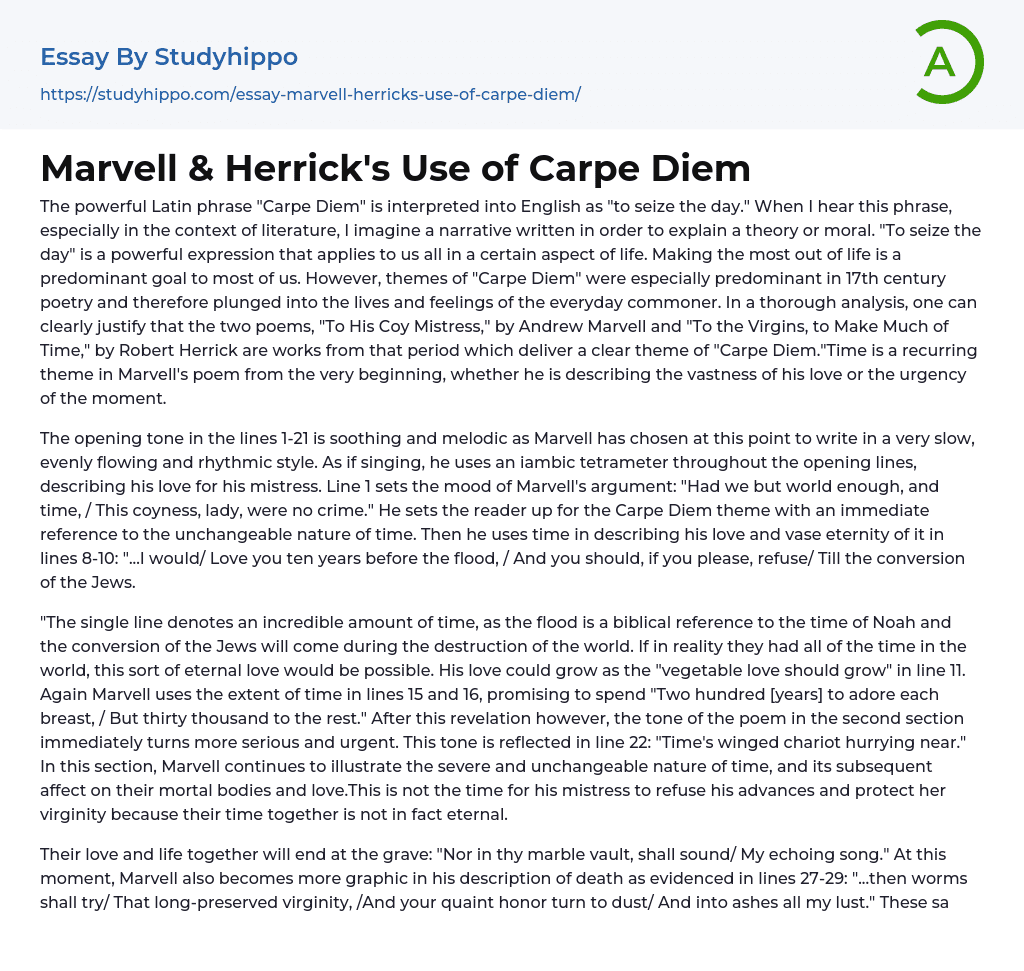The meaning of the Latin phrase "Carpe Diem" is translated as "to seize the day" in English. When I encounter this phrase, particularly in literature, I envision a story created to convey a principle or lesson.
"To seize the day," a powerful expression that applies universally, emphasizes the importance of making the most out of life. This theme of "Carpe Diem" was particularly prevalent in 17th century poetry, resonating with everyday individuals. Two poems from that period, "To His Coy Mistress" by Andrew Marvell and "To the Virgins, to Make Much of Time" by Robert Herrick, clearly express the "Carpe Diem" theme. Time plays a recurring role in Marvell's poem, from the expansive portrayal of his love to the sense of urgency conveyed. Marvell's poem opens with a soothing and melodic tone in lines 1-21, employi
...ng a slow and rhythmic style.
The speaker employs iambic tetrameter throughout the opening lines to express his affection for his mistress. Line 1 establishes the tone of Marvell's argument: "Had we but world enough, and time, / This coyness, lady, were no crime." This line prepares the reader for the Carpe Diem theme by immediately referencing the unalterable nature of time. Furthermore, he utilizes time to describe his love and its everlasting nature in lines 8-10: "...I would/ Love you ten years before the flood, / And you should, if you please, refuse/ Till the conversion of the Jews." This solitary line signifies an immense span of time; the flood alludes to Noah's time in the Bible, while the conversion of the Jews pertains to the world's destruction. If they truly possessed all the time in existence, this kind
of eternal love would be feasible.
In line 11, Marvell expresses that his love could grow like "vegetable love should grow". He further explores the concept of time in lines 15 and 16, promising to spend "Two hundred [years] to adore each breast, / But thirty thousand to the rest." However, the tone of the poem immediately shifts to a more serious and urgent tone in the second section. Line 22 reflects this urgency, stating "Time's winged chariot hurrying near." Marvell continues to illustrate the unchanging nature of time and its impact on their mortal bodies and love. He emphasizes that now is not the time for his mistress to reject his advances and protect her virginity, as their time together is not eternal. Their love and life will end at the grave, as expressed in "Nor in thy marble vault, shall sound/ My echoing song." Marvell becomes more explicit in describing death in lines 27-29: "...then worms shall try/ That long-preserved virginity, / And your quaint honor turn to dust/ And into ashes all my lust." These lines symbolize the sex organs of his mistress as "quaint honor" and his own sex organ as "my lust." In the third section, Marvell employs more metaphors and returns to a regular rhyme scheme, reminiscent of the earlier smooth flow of tone. It is in this section that Marvell presents his solution to the finality of life and death in relation to their love, using metaphors.
The text from lines 33-36 portrays the state of youth and the present moment through metaphors. Marvell compares his mistress' youthful appearance to the innocent freshness of morning dew with phrases like "youthful
hue" and "morning dew". He also describes her face being flushed with desire, expressing it as "At every pore with instant fire." The implication is that his mistress is indeed desirous, but holds back in a hesitant manner, which Marvell sees as a waste of time. In lines 37-40, Marvell suggests that they should engage in enjoyment while they can. He likens them to amorous birds of prey and encourages them to devour their time rather than languishing in its slow passage.
Carpe Diem is the main idea here, as it suggests seizing the moment rather than allowing time to erode it. The speaker advises embracing love with the same intensity as a bird catching its prey, using the strength and power of their affection to resist the passage of time. To fully live in the moment and satisfy their desires, the act of lovemaking is described metaphorically in lines 41-44: "Let us roll all our strength and all/ Our sweetness up into one ball, /And tear our pleasures with rough strife/ Through the iron gates of life." Marvell concludes that though they cannot halt time's advance, they can defy its finality by embracing the present moment and consummating their love.
- Book Summary essays
- Metaphor essays
- Reader essays
- Rhyme essays
- Literary devices essays
- Villain essays
- Books essays
- Genre essays
- Literary Criticism essays
- Writer essays
- Protagonist essays
- Simile essays
- Poem essays
- Book Report essays
- Book Review essays
- Greek Mythology essays
- Plot essays
- Tragic Hero essays
- Coming of Age essays
- Play essays
- Rhetoric essays
- Rhetorical Question essays
- Translation essays
- Understanding essays
- Reason essays
- Character essays
- Letter essays
- American Literature essays
- Literature Review essays
- Utopia essays
- Poetry Analysis essays
- Dante's Inferno essays
- Between The World and Me essays
- Incidents in The Life of a Slave Girl essays
- Flowers for Algernon essays
- Myth essays
- Everyday Use essays
- Boo Radley essays
- Genesis essays
- Richard iii essays
- Alice in Wonderland essays
- On the road essays
- Ozymandias essays
- The Nightingale essays
- Holden Caulfield essays
- Animal Farm essays
- 1984 essays
- A Hanging essays
- Shooting An Elephant essays
- A Tale Of Two Cities essays




